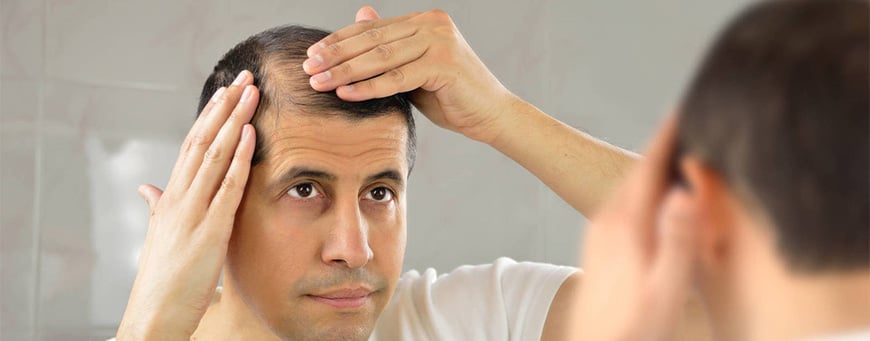Seasonal hair loss: When and why does it happen?
By Prof. Dr. Soner Tatlidede 2020-01-13

Seasonal hair loss is associated with a hair loss due to seasonal shedding, occurring more abundantly during certain seasons of the year that others, or at least that´s how many people perceive it. If normally a person may lose between 100 to 120 hairs daily, during seasonal hair loss the rate of hair falling out is mucho more bigger.
If you suffer this problem and you have started to take a look to the cost of a hair transplant in Turkey, don´t worry: seasonal shedding is not a reason to get a transplant, neither even to receive treatment. But, why is that seasonal hair loss happens? How can we distinguish it from the first symptoms of alopecia? Is there a way to prevent it? Let´s find an answer for all this common queries.
Table of contents
Seasonal hair loss - Myth or reality?
Despite that some experts consider that seasonal hair loss is almost an urban legend, and that there are other reasons behind the increase of hair loss in certain seasons of the year, the truth is that most experts affirm that many people suffer hair fall more abundantly in some seasons. But, what´s the cause behind this abnormal hair loss?
Well, mammals change their fur twice a year to adapt themselves to seasonal changes, including temperature, humidity or solar radiation levels; we humans have evolved enough to lose almost all hair in our bodies, and what is left is kept stable throughout the year; however, this doesn´t mean that our body doesn´t adapt itself to environment changes, too: that´s why we lose more hair in some seasons than in others.
In any case, it´s important to underline that hair loss due to seasonal changes is minimal compared to other factors that may cause the falling out of hair, or even baldness; these factors include genetics, lifestyle (stress, diet, tiredness...), using certain techniques or products aggressive with our hair, or side effects caused by some diseases or by some medications.
How can we distinguish seasonal hair loss from symptoms of alopecia?
If we see that our hair falls out more during certain periods of the year, this shouldn´t be a reason to worry about. How long does seasonal hair loss last? Well, the duration usually is limited to 1 or 2 months at most, and after that hair grows back again. Don´t forget that hair falls out, but at the same time new hair starts to grow.
Problem starts however when, after that time has passed, we observe that we have lost density in our scalp, or that our hair is growing thinner or weaker: these are evident symptoms of a problem that is not related with seasonal changes, but with other causes, so we need to consult a doctor and ask for a proper diagnosis and a treatment in time.
In general terms, we can distinguish seasonal hair loss from other causes that provoke hair problems taking into account the following considerations:
- During seasonal hair loss, the appearance of hair does not change; the opposite thing happens when there is a hair loss problem caused by other reasons.
- In seasonal loss, hair density is also maintained, and there is not volume loss.
- If we are facing a problem of alopecia caused by an illness, stress, a poor diet or other factors, density is lowered in the full scalp or in specific areas, such as the crown.
- A symptom of alopecia is when hair appears thinner or unhealthy, especially in the root, which is a sign of weakening.
In which season hair fall is more abundant?
Normally, there is a seasonal hair loss in spring; however, seasonal hair loss in autumn is more pronounced during the so-called seasonal effluvium (a type of telogen effluvium): in this period hair regeneration is increased, and we can lose even 1,000 hairs a day; besides, female seasonal hair loss becomes more evident than in males.
Seasonal hair loss in summer can also be especially important in the final weeks of the season, when our hair has been punished by the sun and high temperatures. On the contrary, seasonal hair loss in winter is not common, and usually it´s in this period of the year when our scalp recovers and there is a bigger hair regeneration rate, although this may vary depending on each person and its lifestyle.
Seasonal hair loss: 5 ways to reduce hair loss this fall
If we observe a hair loss during a seasonal change, and there is no change in the structure, appearance or density of our hair, there shouldn´t be a reason to worry about hair loss. But if we notice an excessive fall (even in other areas such as eyebrows or eyelashes), or if there is a loss of density, or itching, inflammation or scarring occurs in areas without hair, you should go to a doctor.
Also, if you think about how to stop seasonal hair loss, there are some recommendations to follow that can help you to reduce or minimize hair loss during seasonal changes, such as:
- wash regularly your hair with non-aggressive shampoos, and avoid brushing your hair when still wet
- take some vitamins for hair loss
- Take high-protein diets
- Massage your scalp with essential oils
- Keep your body hydrated, especially in summer
If you have any other question about seasonal hair loss, or if you suffer from hair loss and you wonder what are the reasons behind, just remember: at Clinicana you have an online free consultation service, and we have the best specialists to solve your hair problems. Simply check the reviews about hair transplant in Turkey, and find out why we are the best rated clinic. Trust us!









